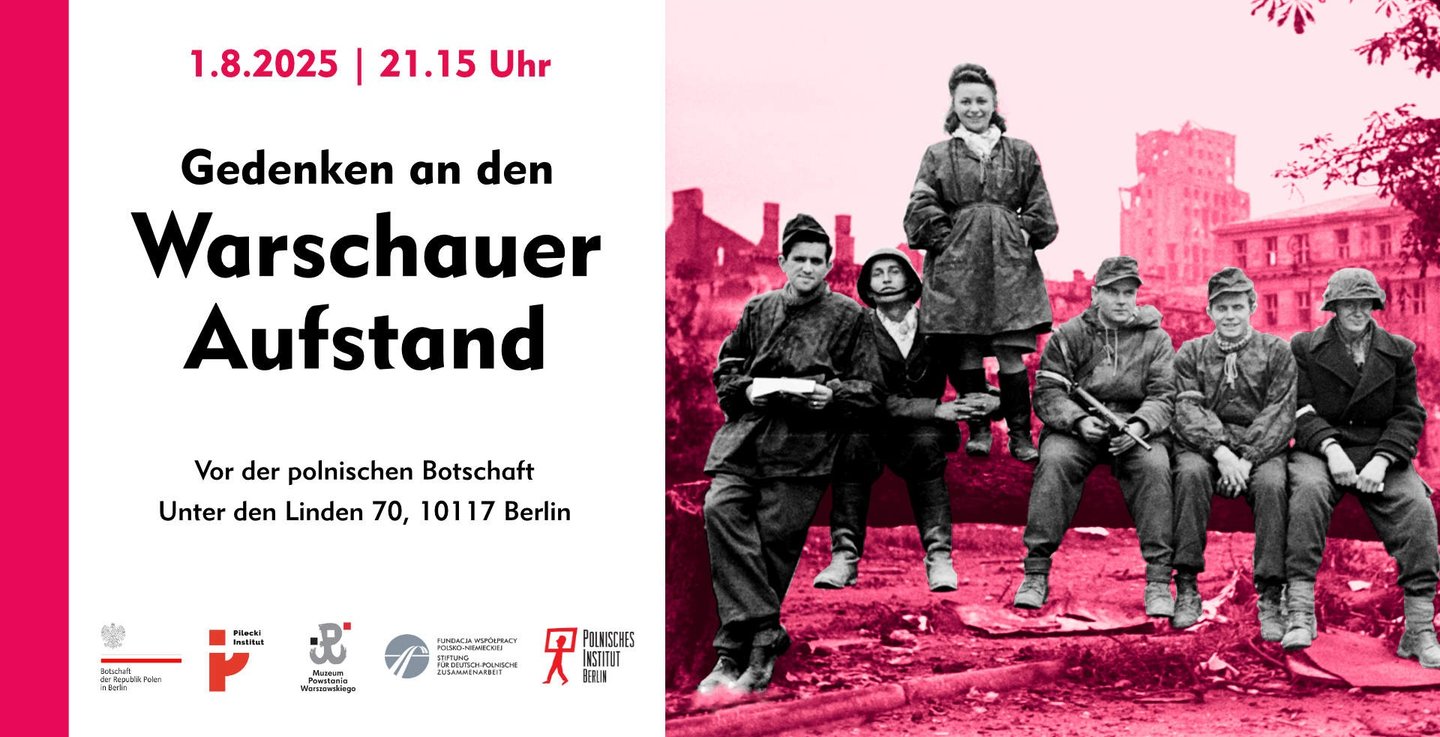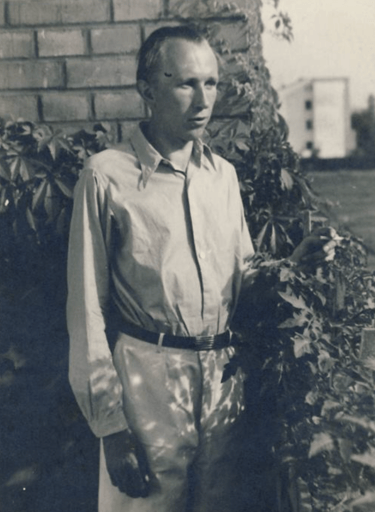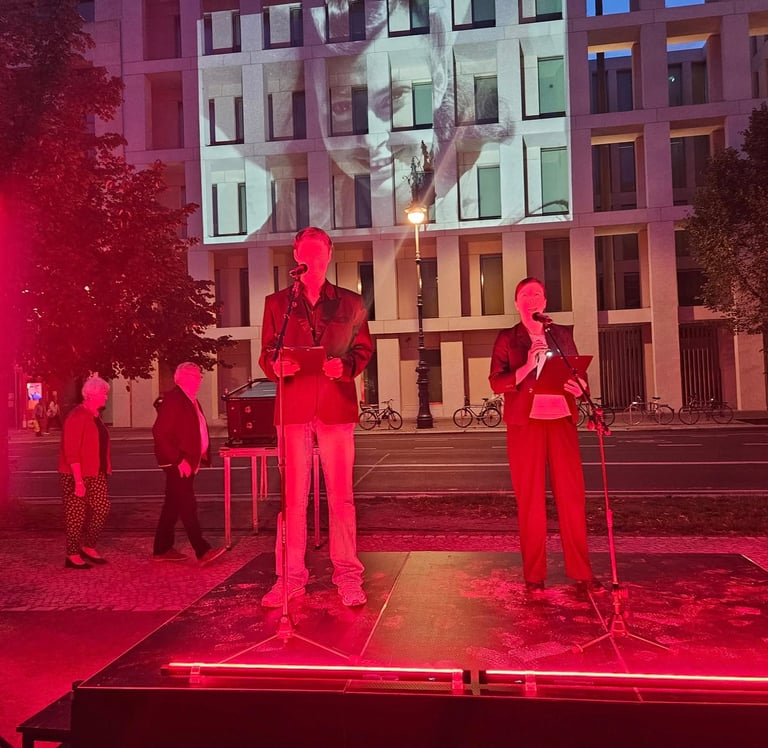WARSAW UPRISING 2025
The Warsaw Uprising was the largest underground armed operation against Nazi Germany during the Second World War. Originally planned to last just a few days, it continued for 63 days — a heroic, yet unequal and largely isolated struggle for a free and independent Poland, liberated from German occupation and Soviet dominance. Warsaw suffered the highest death toll of any European city during the war. The Soviet army, stationed on the opposite bank of the Vistula River, did not intervene; they waited until the city was destroyed and the Home Army defeated.


Remembering Warsaw Uprising
An evening of remembrance, where Berliners gathered to commemorate the insurgents of the Warsaw Uprising, which broke out on August 1, 1944. My grandfather, Tadeusz Krenz, also participated in Warsaw Uprising, so working on this event also had a personal meaning for me.
At the invitation of the Pilecki Institute in Berlin, I curated the event together with the Institute’s team. The event created as the #InstantTheatre, was not only a tribute to the victims, but also a celebration of life, courage, and the resilience of the insurgents.
The evening, moderated by Mateusz Fałkowski, consisted of three parts: an official segment with speeches and a minute of silence; a literary section with readings of memoirs and poems by insurgents and civilians, and finally a musical part. By keeping the official part — traditionally featuring men in suits — to a minimum and focusing on the voices of the insurgents themselves, I aimed to truly give them back their voices.
In the literary segment, actress Mareike Wenzel and Max Hossner read selected texts in German, followed by audience members who were invited to read excerpts in Polish (and German). This interactive part was designed to bring the audience closer to the lived experiences of the insurgents – their fear, sorrow, euphoria, and the absurd humour they used to cope with the horrors they endured. Mareike Wenzel read memories from a resident of 28 Koszykowa Street, memoirs by Barbara Bobrownicka-Fricze (pseudonym: Oleńka), and excerpts from a 1946 interrogation of Wiesława Chełmińska, regarding the Wola Massacre.
Max Hossner read fragments from Miron Białoszewski’s memoirs and a poem by Anna Świrszczyńska, in my translation.
During the readings, we projected large-format portraits of insurgents onto the façade of the Polish Embassy (Unter den Linden 70), as well as the film „City of Ruins”, courtesy of the Warsaw Rising Museum. The façade was also illuminated with a large symbol of the Uprising — the so-called "Anchor", emblem of Fighting Poland. In recent years in Poland, nationalists and neo-Nazis have claimed the right to use historical symbols. With this event, I once again aimed to reclaim this narrative from right-wing fanatics — because history belongs to all of us.
Following the emotionally intense and contemplative literary section, the musical part began with a moving performance of the melancholic song „Deszcz, jesienny deszcz” (Autumn Rain) by Dorota Puszakowska, with musical accompaniment. This song served as a gentle transition from poetry and reflection to insurgent songs of joy and defiance, intended to give us all a sense of strength and togetherness through collective singing. Songs and music have always accompanied the Polish struggles for freedom and independence — on the marches, in the camps, on the battlefields. During the war, it was more than entertainment: it gave strength, brought comfort, and lifted spirits. Many songs were created in occupied Poland, and some remain alive in our collective memory to this day. They were sung by partisans, scouts, and units of the Home Army. During „Deszcz, jesienny deszcz”, members of the band „Surowica” — Weronika Regosz, Ania Svetozarov, and Izabela Obłaczyńska — joined Dorota Puszakowska on stage with umbrellas to illustrate the lyrics of the song. Black umbrellas have also become a symbol of Polish feminist protests for women’s rights, referencing the “Black Protest” of 3 October 2016. Together with the audience, „Surowica” performed four songs: „Pałacyk Michla”, „Marsz Mokotowa”, „Serce w plecaku” and „Warszawskie Dzieci” (Children of Warsaw). The audience received printed songbooks with lyrics in Polish and translations into German.
The evening ended on a high note — full of energy, shared emotion, and a renewed sense of solidarity and strength to continue fighting for freedom, equality, and democracy in these turbulent times.




Curator, concept and graphic design: Anna Krenz
Collaboration: Hanna Radziejowska
Moderation: Mateusz Fałkowski
Readings: Mareike Wenzel and Max Hossner
Team: Karolina Głowińska, Klaudia Zheng, Kamila Szuba, Anna Bobczuk, Patryk Szostak, Adam Czerwień, Jacob Steinhoff
Music: Dorota Puszakowska and Surowica — Weronika Regosz, Ania Svetozarov, Izabela Obłaczyńska
Organisers: The Embassy of the Republic of Poland in the Federal Republic of Germany and the Pilecki Institute in Berlin, in cooperation with the Warsaw Rising Museum, the Polish Institute in Berlin and the Foundation for Polish-German Cooperation.